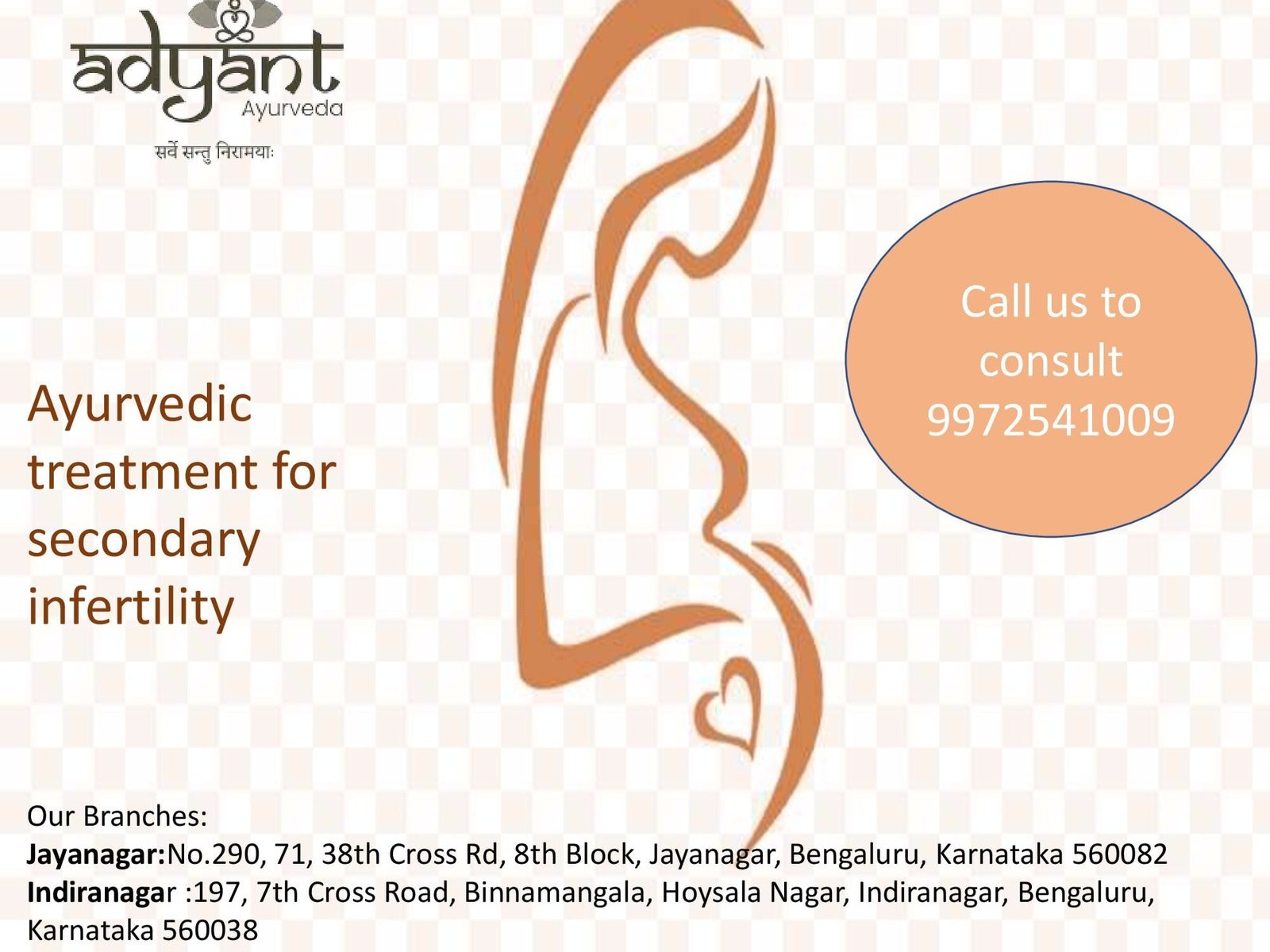Table of Contents
Toggle🌿 Ayurvedic Treatment for Secondary Infertility – Causes, Remedies & Panchakarma Therapies
What is Secondary Infertility?
Secondary infertility is when a couple has successfully conceived at least once in the past but is now unable to conceive again despite trying for over a year without contraception.
Ayurveda classifies this condition under Vandhyatva and attributes it to an imbalance in Vata dosha, hormonal irregularities, impaired reproductive tissue (Shukra Dhatu in males and Artava Dhatu in females), and blocked reproductive channels (Artavavaha Srotas).
Difference Between Primary, Secondary Infertility & Complete Sterility
| Type of Condition | Definition |
|---|---|
| Primary Infertility | A couple has never been able to conceive after at least 1 year of unprotected sexual intercourse. |
| Secondary Infertility | A couple has conceived at least once in the past but is now unable to conceive again. |
| Complete Sterility | Permanent inability to conceive due to the absence of reproductive organs or irreversible medical conditions. |
Causes of Secondary Infertility (Ayurvedic + Modern View)
Ayurvedic Causes
Vata imbalance leading to disturbed ovulation/spermatogenesis
Weak reproductive tissue (Shukra / Artava Dhatu)
Blocked reproductive channels (Srotorodha)
Excessive heat (Pitta vitiation) affecting sperm/ovum quality
Accumulated toxins (Ama) hampering conception
Modern Causes
Age-related decline in fertility
Endometriosis, fibroids, pelvic inflammatory disease
Previous childbirth complications or surgery after the first delivery
- Blocked fallopian tubes
Ayurvedic Nidana (Causes) Classification
Beeja Dushti – defects in sperm or ovum
Kshetra Dushti – uterine or seminal vesicle abnormalities
Rutu Dushti – improper ovulation/ejaculation timing
Aahara–Vihara Dosha – poor diet, excess alcohol, late nights, excessive heat exposure, sedentary lifestyle
Ayurvedic Treatment Approach
Ayurveda aims to:
Detoxify the body to clear reproductive channels
Balance doshas (mainly Vata and Pitta)
Rejuvenate reproductive tissues
Regulate hormonal functions naturally
Improve mental well-being for conception readiness
Panchakarma Therapies for Secondary Infertility
Panchakarma detoxifies and restores reproductive vitality by:
Removing Ama (toxins)
Correcting Agni (digestive fire)
Nourishing Dhatus (tissues)
Balancing hormones
Improving pelvic blood circulation
For Women: Uttar Basti, Virechana, Vamana, Lekhana Basti, Udwarthanam, Shirodhara, Nasya.
For Men: Virechana, Matra Basti, Nasya, Rasayana therapy with Ashwagandha Lehyam or Musli Pak.
| Panchakarma Therapy | Benefits |
|---|---|
| Virechana (Purgation Therapy) | Eliminates excess Pitta, balances hormones, and detoxifies the reproductive system. |
| Basti (Medicated Enema) | Additionally, Uttara Basti helps clear tubal blockages and nourish the uterine lining. |
| Nasya (Nasal Administration) | Regulates hormonal centers in the brain and relieves stress. |
| Vamana (Therapeutic Emesis) | Useful if Kapha imbalance is obstructing ovulation/spermatogenesis. |
| Abhyanga & Swedana | Improves blood circulation to reproductive organs and reduces stress. |
| Pizhichil / Patra Pinda Sweda | Nourishes tissues, reduces pain, and improves ovulatory cycles. |
Ayurvedic Medicines for Secondary Infertility
| Medicine / Formulation | Main Ingredients | Benefits |
|---|---|---|
| Ashwagandha Churna | Withania somnifera | Improves sperm count & motility, reduces stress. |
| Shatavari Churna | Asparagus racemosus | Nourishes female reproductive organs, balances hormones. |
| Phala Ghrita | Cow ghee, herbs | Improves uterine health & ovulation. |
| Kapikacchu Churna | Mucuna pruriens | Boosts libido & sperm quality. |
| Dashmoolarishta | Dashamoola herbs | Balances Vata & improves reproductive functions. |
| Rajapravartini Vati | Aloe vera, Ferula asafoetida | Regulates menstrual cycles & ovulation. |
| Gokshuradi Guggulu | Tribulus terrestris | Improves sperm quality & urinary health. |
| Sukumaram Kashayam | Herbal decoction | Useful for uterine cleansing & menstrual health. |
| Chandraprabha Vati | Multiple herbs & minerals | Improves reproductive tissue strength. |
| Beeja Shodhana Therapy | Various purificatory herbs | Enhances sperm & ovum quality before conception. |
Note: All medicines must be taken only under an Ayurvedic physician’s guidance.
Diet & Lifestyle Recommendations (Pathya-Apathya)
Recommended Foods (Pathya)
Freshly cooked whole grains – wheat, rice, barley
Ghee, milk, fresh curd
Almonds, walnuts, dates
Green leafy vegetables
Mung dal, sesame seeds, flax seeds
Fruits – figs, pomegranate, papaya (ripe)
Avoid (Apathya)
Junk food, processed snacks
Excess caffeine, alcohol, smoking
Overeating or irregular meals
Excessively spicy, sour, and fermented foods
Late-night sleep
Yoga & Meditation for Conception
Yoga Asanas: Baddha Konasana, Bhujangasana, Viparita Karani, Paschimottanasana
Pranayama: Nadi Shodhana, Bhramari, Anulom Vilom
Meditation: Reduces stress and improves hormonal balance
Seasonal Conception Advice (Ritucharya for Garbhadhana)
Ayurveda recommends conception during optimal ovulatory periods and after detoxification to ensure healthy progeny. Avoid conception in Sharad Ritu for Pitta-dominant individuals.
Post-Conception Care (Garbhini Paricharya)
Once conception occurs, Ayurveda prescribes monthly dietary and lifestyle guidelines to ensure proper fetal development and maternal health, including herbal support like Sukumara Ghrita and gentle yoga.
Real Case Example from Adyant Ayurveda
“A 34-year-old woman with a history of one child and 4 years of infertility came to Adyant Ayurveda Jayanagar branch. After 3 months of Panchakarma (Uttar Basti, Virechana), fertility herbs, and lifestyle correction, she conceived naturally. Dr. Shree Lakshmi supervised treatment.”
Ayurvedic Treatment for Infertility Case Studies by Adyant Ayurveda
- Management of Tubal Blockage Through Ayurvedic Intervention – A Case Study From Adyant Ayurveda
- Ayurvedic Management of Oligospermia (Male Fertility) with Type 2 Diabetes: A Success Story from Adyant Ayurveda
Ayurvedic Preconception Care (Garbha Samskara)
For couples trying to conceive again, Ayurveda emphasizes preparation of both partners before conception:
Detoxification (Shodhana): Panchakarma therapies like Virechana and Basti to remove toxins.
Rasayana Therapy: Rejuvenation treatments to strengthen reproductive tissues (Shukra Dhatu in men, Artava Dhatu in women).
Ahara & Vihara: Fertility-boosting diet (milk, ghee, almonds, figs) and stress-reducing lifestyle practices (yoga, meditation).
Ritu Chakra Awareness: Understanding the fertile window and timing intercourse accordingly.
Why Choose Ayurveda for Secondary Infertility?
Ayurveda offers a holistic, time-tested approach to address the root causes of secondary infertility, focusing on balancing doshas, cleansing toxins, and rejuvenating the reproductive system. Unlike symptom-based treatments, Ayurvedic care integrates personalized therapies, herbal medicines, and lifestyle corrections to restore natural fertility.
Key reasons to consider Ayurveda:
Root Cause Approach: Addresses hormonal imbalance, stress, and uterine health.
Safe & Natural: Uses plant-based formulations and body detoxification without synthetic chemicals.
Personalized Care: Treatment is tailored according to prakriti (body constitution) and vikriti (imbalance).
Integrative Support: Can be combined with modern diagnostic and assisted reproductive techniques for better results.
Why Consult an Expert at Adyant Ayurveda
At Adyant Ayurveda, we pride ourselves on having one of the most experienced and specialized teams in Ayurvedic fertility care. Our senior doctors bring over 25 years of collective expertise each, ensuring you receive safe, evidence-based, and highly personalized treatment.
Meet Our Fertility Experts:
Dr. Shree Lakshmi – Jayanagar Branch – 28 years of expertise in Ayurvedic infertility management, Panchakarma therapies, and women’s health.
Dr. Preethi – 24 years of clinical experience specializing in reproductive health and holistic wellness.
Dr. Vidya – 19 years of experience with a focus on female infertility, hormonal balance, and Ayurvedic nutrition.
Dr. Sumana Patvardhana – Indiranagar Branch – 24 years of experience in managing complex infertility cases with integrative Ayurvedic and modern diagnostic approaches.
At Adyant Ayurveda, our treatments combine:
Authentic Ayurvedic Therapies: Panchakarma, Rasayana, Uttar Basti, and herbal formulations.
Modern Diagnostic Support: Hormone profiling, ultrasound guidance, and fertility assessments.
Personalized Fertility Plans: Tailored according to prakriti (constitution), age, medical history, and root cause of infertility.
With decades of hands-on experience, our doctors have helped thousands of couples overcome secondary infertility naturally—restoring not just fertility but also overall reproductive wellness.
Conclusion
Ayurveda offers a holistic and personalized approach to secondary infertility by addressing its root causes rather than just symptoms. Detoxification through Panchakarma, strengthening reproductive tissues with herbal medicines, adopting a fertility-supportive diet, and practicing yoga & meditation can significantly improve conception chances.
Adyant Ayurveda, with its team of expert doctors and specialized Panchakarma therapies, provides effective and safe treatment for secondary infertility, tailored to each patient’s needs.
Patients Voice After Infertility Treatment at Adyant Ayurveda
Doctor’s Voice on Ayurvedic Treatment for Infertility Treatment
FAQs on Ayurvedic Treatment for Secondary Infertility
What is secondary infertility?
Secondary infertility is when a couple who has conceived at least once in the past is now unable to conceive again after a year of unprotected intercourse. It can affect both men and women and may have hormonal, structural, or lifestyle-related causes.
Can Ayurveda cure secondary infertility?
Yes. Ayurveda can help by addressing the root cause—balancing doshas, detoxifying the body, improving reproductive tissue (Shukra & Artava Dhatu), enhancing egg and sperm quality, and reducing stress through Panchakarma therapies and herbal formulations.
What are the main causes of secondary infertility in Ayurveda?
Ayurveda identifies causes such as Vata imbalance, Beeja Dushti (defect in sperm/ovum), Artava Kshaya (low menstrual health), Shukra Kshaya (low sperm count), Agnimandya (weak digestion), and Srotorodha (blockages in reproductive channels).
Which Panchakarma therapies are used for secondary infertility?
Common Panchakarma treatments include Uttar Basti, Virechana, Vamana, Lekhana Basti, Udwarthanam, Shirodhara, and Nasya, each chosen based on the root cause and individual constitution (Prakriti).
What herbs are used in Ayurveda for secondary infertility?
Herbs like Shatavari, Ashwagandha, Kapikacchu, Gokshura, Shilajit, Ashoka, Dashmoola, and Guduchi are commonly prescribed. The selection depends on whether the cause is hormonal imbalance, structural blockage, stress, or low AMH levels.
Can blocked fallopian tubes be treated with Ayurveda?
Yes. Uttar Basti is an effective Ayurvedic therapy for cleansing and nourishing the uterus and fallopian tubes, helping to remove blockages and improve the chances of conception.
Does stress cause secondary infertility?
Yes. Chronic stress disrupts hormonal balance and ovulation. Ayurveda uses Shirodhara, Takradhara, Abhyangam, Nasya, meditation, and pranayama to calm the mind and restore reproductive health.
How does diet affect fertility according to Ayurveda?
A Vrushya Ahara (fertility-boosting diet) nourishes reproductive tissues. Ayurveda recommends fresh fruits, vegetables, whole grains, nuts, seeds, dairy, and warm, easily digestible meals, while avoiding processed, fried, stale, and incompatible foods (Viruddha Ahara).
How long does Ayurvedic treatment for secondary infertility take?
It depends on the cause, age, and overall health of the couple. Generally, a 3–6 month treatment plan combining Panchakarma, herbs, and lifestyle changes is recommended for best results.
Is Ayurvedic infertility treatment safe?
Yes. Ayurvedic treatment is natural, holistic, and generally free from side effects when prescribed by a qualified Ayurvedic doctor after a proper diagnosis.
Medical Disclaimer
Disclaimer: The information in this article is for educational purposes only and should not be considered as a substitute for professional medical advice. Always consult a qualified Ayurvedic physician or healthcare provider before starting any treatment, especially if you have underlying health conditions or are undergoing modern medical therapies.









